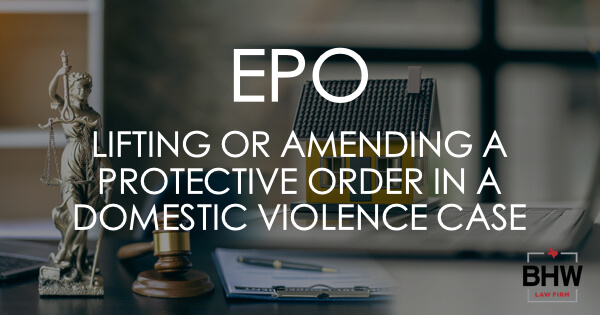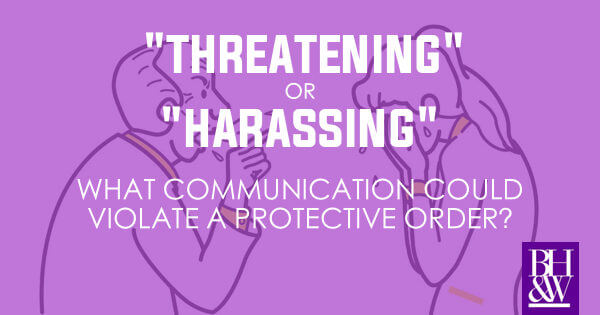Assault of a Family Member | Fort Worth Assault Defense Lawyers
Assault of a Family Member, sometimes called Domestic Violence or Domestic Abuse, is one of the most charged crimes in Tarrant County. Our Fort Worth domestic violence defense lawyers understand that most of these situations begin with a simple misunderstanding between a husband and wife, a boyfriend and girlfriend, or two other people in a domestic relationship. The misunderstanding spirals out of control, perhaps threats are made or objects are thrown. There may be pushing, hitting or some other form of physical violence.
One person calls the police, hoping that a police officer will come and sort the dispute out. However, when the police officer arrives, he or she makes an arrest, because he or she is required to. One person is charged with assault — domestic violence, and taken away. Many times, the police officers make an arrest for Assault Family Violence against the wishes of all parties involved and when there is no ongoing emergency or visible injury. Sometimes, they even arrest the person that made the 911 call looking for help.
What is Domestic Violence in Texas? | What is Assault Family Violence?
In the Texas criminal law context, the term “domestic violence” does not exist. The most common charges in domestic violence situations are:
-
Assault (Causing Bodily Injury) to a Family Member
This offense is a Class A Misdemeanor, which carries a range of punishment of 0 – 365 days in Tarrant County Jail, and $0 – $4,000 fine.
-
Assault of Family Member by Impeding Breath (Choking)
This offense is a 3rd Degree Felony, which carries a range of punishment of 2 years – 10 years in the State Penitentiary, and $0 – $10,000 fine.
-
Assault of Family Member with a Prior Assault
This offense is a 3rd Degree Felony, which carries a range of punishment of 2 years – 10 years in the State Penitentiary, and $0 – $10,000 fine.
-
Assault of Family Member, 2 within 12 Months
These 2 assaults are combined to form a 3rd Degree Felony, which carries a range of punishment of 2 years – 10 years in the State Penitentiary, and $0 – $10,000 fine.
Can the victim drop domestic violence charges in Fort Worth?
With so many people being arrested for Assault of a Family Member, we are often asked by spouses and loved ones: “How can I dismiss the assault charges?” Technically, you can’t. The Tarrant County District Attorney’s Office has a “No-Drop” policy on cases of Assault (Bodily Injury) of a Family Member. However, despite this no-drop policy, the Fort Worth Domestic Violence Defense Lawyers at Barnett Howard & Williams have experienced considerable success in getting Domestic Assault charges dropped and dismissed. Our attorneys know the options available. We will push to have the case dismissed, if appropriate. We will pursue an affidavit of non-prosecution. When it makes sense, we may suggest that the accused attend a batterers’ intervention class or some other form of treatment, if some form of abuse actually took place. Our goal is to get you through this without a conviction and without a criminal record.
What is an Affidavit of Non-Prosecution?
An Affidavit of Non Prosecution is a sworn legal document that a victim of domestic assault can file with the prosecutor to express a desire for the case to be dismissed, dropped, or reduced to a lesser charge. An Affidavit of Non-Prosecution does not create any legal obligation on the district attorney to dismiss that case, but what we have seen in Fort Worth is that prosecutors take the Affidavit of Non-Prosecution very seriously when deciding how to proceed on cases involving Assault of a Family Member. The most effective way to file and Affidavit of Non-Prosecution in Fort Worth is to arrange a meeting with the Tarrant County Victim Coordinator and file the affidavit during that meeting. The Victim Coordinator and the assistant district attorney will interview the victim and if appropriate, help them file the Affidavit of Non-Prosecution. Another way to file the affidavit is the have the criminal defense lawyer help you, but sometimes the prosecutor will not give much weight to affidavits that come through the defense attorney.
What is an Emergency Protective Order? | Fort Worth Protective Order Defense Lawyers
An Emergency Protective Order or EPO is an Order from the court that prohibits a person accused of family violence from doing certain acts against the alleged victim. It may prevent someone from committing family violence or assault, communicating in a harassing or threatening manner, going within 500 feet of particular residence, workplace or school, or possessing a firearm. An Emergency Protective Order may be issued on request from a police officer, an alleged “injured party,” or an attorney for the State. An EPO can be effective for 31 – 91 days depending on the nature of the injuries involved. While someone is subject to an EPO, that person MAY NOT possess a firearm. This is a very strict federal law and could result in a felony conviction if violated. If there was an EPO issued in your case, you should be very careful not to violate the order, even if the alleged victim requests it. Violation of a Protective Order is a separate criminal offense and could end up derailing your chances for a dismissal in the underlying assault case.
How can I lift or modify the Protective Order in Tarrant County?
Many families request the assistance of our Fort Worth Domestic Violence Attorneys in getting the EPO lifted so that the defendant can return home to be with the family and help with family duties. Typically, if the alleged victim is agreeable to this, our attorneys are able to get the EPO modified or lifted so that the defendant can return home without fear of violating the protective order. The court that issued the emergency protective order or the court in which the case was filed can modify all or part of the order. Under Article 17.292 of the Texas Code of Criminal Procedure, in order to get the order modified, the judge must find:
- That the EPO as originally issued is unworkable;
- That the modification of the EPO will not place the victim of the offense at greater risk than did the original order; and
- That the modification will not in any way endanger a person protected under the order.
If you want to lift or modify a protective order that was issued after an allegation of Assault Family Violence, you should contact us immediately so we can get started. Please note that the district attorney’s office has the right to demand a hearing before an EPO is modified, and in our experience, they almost always demand this hearing.
Is the Alternatives Class required for a dismissal of a family violence case?
No. Many times the Tarrant County Victim Coordinator or the Assistant District Attorneys will inform a victim that the Alternatives Class at Safe Haven is required before they will consider a dismissal. However, our attorneys have negotiated numerous dismissals on misdemeanor domestic violence assault cases in which the injured party did not attend the Alternatives Class. This does not mean that the District Attorney would never require Alternatives but it is simply not true that the prosecutor will not consider dismissing a case without a certificate from Alternatives. Our advice to the injured party is to take the class if he or she can. Taking the Alternatives Class shows the prosecutor that after having been educated on the cycle of domestic violence, you still desire a dismissal in this case.
Do I have to take Anger Management or Partner Abuse Intervention Program (PAIP) Classes for a domestic violence case?
It depends. In many cases, our Fort Worth Family Violence Defense Attorneys recommend that the client complete either Anger Control Counseling (ACC) or PAIP (formerly the Batterer’s Intervention Prevention Program (BIPP)). These programs provide valuable rehabilitation and education and are regarded favorably by the prosecutors in County Criminal Court 5, Tarrant County’s Family Violence court. Depending on the nature of the allegations and the criminal history of the defendant, we may recommend one program over the other. In some cases, we do not recommend either ACC or PAIP. Every case and client is different and it is best to discuss these options with an experienced Fort Worth Domestic Violence defense attorney first.
What if the alleged victim was not actually a family member?
While the law says “family member,” it leaves a lot of room for other relationships in the net of family violence cases. In addition to traditional relatives, family violence allegations can be levied when the injured party is a roommate, boyfriend, domestic partner, common law spouse, foster child, and more.
Can I still own a firearm if I am convicted of Domestic Assault?
No. According to Federal law, anyone that is convicted of a crime of domestic violence may not own, possess, or transfer firearms or ammunition. This is true even if the offense is reduced to Class C Assault by Contact or if the judge does not make an affirmative finding of family violence. The loss of the right to possess a firearm has no time limitation to it. It remains in place forever. Further, the law does not distinguish between a whether the case ended in Probation, Deferred Adjudication, Jail Time, or Reduction to a lesser assault charge. This is why an outright dismissal is key in family violence cases.
Can I get a Domestic Violence conviction expunged or non-disclosed in Fort Worth?
No. An Assault Family Violence case can never be cleared from your record UNLESS it results in a DISMISSAL of all charges. Even deferred adjudication sentences that do not result in a conviction cannot be sealed under the law. This is often a confusing concept, so it is important to get sound advice as it relates to possible expunction or non-disclosure if you are charged with a domestic violence offense in Texas.
Free Consultation With An Experienced Attorney Who Defends Domestic Abuse Charges
At Howard Lotspeich Alexander & Williams PLLC, our attorneys have considerable experience in Domestic Violence cases. Our Fort Worth Assault Family Violence attorneys have achieved many favorable results in Tarrant County domestic violence cases, including dismissals, reduced charges, and not guilty verdicts. Call 817-993-9249 or send an email to learn how we can help you fight family and spousal abuse charges.
Related Content | Texas Domestic Assault Law
Recent News / View All Posts










